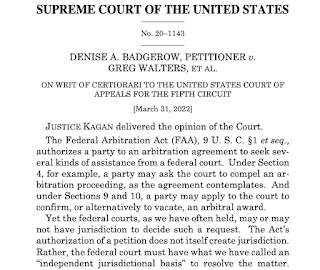Orlando Mediator Lawrence Kolin explores current issues in Alternative Dispute Resolution, including mediation and arbitration of complex cases by neutrals resulting in settlement of state and federal litigation and appeals. This blog covers a wide variety of topics-- local, national, and international-- and includes the latest on technology and Online Dispute Resolution affecting sophisticated lawyers and parties to lawsuits.
Wednesday, April 20, 2022
Comments on Non-Binding Arbitration due 5/6
The Supreme Court of Florida's Standing Committee on Alternative Dispute Resolution Rules and Policy is charged with monitoring and making recommendations to improve and expand the use of court-connected Alternative Dispute Resolution (ADR) not limited to mediation through the recommendation of the adoption of statutes, rules, policies, and procedures. This Committee is seeking feedback on two proposed amendments related to statutory non-binding arbitration. Specifically, they are considering revisions to Rule 1.820, Florida Rules of Civil Procedure (Hearing Procedures for Non-Binding Arbitration) and Section 44.103, Florida Statutes (Court-ordered, nonbinding arbitration). While the ADR Section of the Florida Bar whose Executive Council on which I serve will be commenting on behalf of its almost one thousand members, please consider individually responding to these proposals. The Florida State Court System consists of 20 judicial circuits that encompass Florida’s 67 counties and so practice in this area of ADR varies widely under local administrative orders. Comments are due to the Florida Dispute Resolution Center on or before Friday, May 6, 2022, via drcmail@flcourts.org. The proposed revisions can be found here-- https://tinyurl.com/3r986y25 and https://tinyurl.com/4w2tfuje
Friday, April 1, 2022
FAA Jurisdiction Case Decided by SCOTUS
The Supreme Court of the United States yesterday issued an important ruling on federal court jurisdiction in matters governed by the Federal Arbitration Act (FAA) saying it does not allow federal courts to “look through” to the dispute underlying an arbitration to establish jurisdiction to confirm or vacate an arbitration award. The FAA authorizes a party to an arbitration agreement to petition a federal court for various forms of relief. The Act’s authorization of such petitions does not itself create the subject matter jurisdiction necessary for a federal court to resolve them. Previously, in Vaden v. Discover Bank, the Court assessed whether there was a jurisdictional basis to decide an FAA Section 4 petition to compel arbitration by means of examining the parties’ underlying dispute. Specific language in Section 4 instructed a federal court to “look through” the petition to the “underlying substantive controversy.” If the dispute underlying a Section 4 petition falls within the court’s jurisdiction for example, by presenting a federal question, then the court may rule on the petition to compel arbitration. In this case, Badgerow v. Walters, the question presented was whether that “look-through” approach to jurisdiction applies to applications to confirm or vacate arbitral awards under Sections 9 and 10 of the FAA. The majority ruled Congress chose to respect the capacity of state courts to properly enforce arbitral awards. Justice Kagan writes "the look-through rule is a highly unusual one: It locates jurisdiction not in the action actually before the court, but in another controversy neither there nor ever meant to be." This application in an employment termination case should go to state, rather than federal, court raising claims between non-diverse parties involving state law. See opinion here-- https://bit.ly/3DyArhT
Subscribe to:
Posts (Atom)

